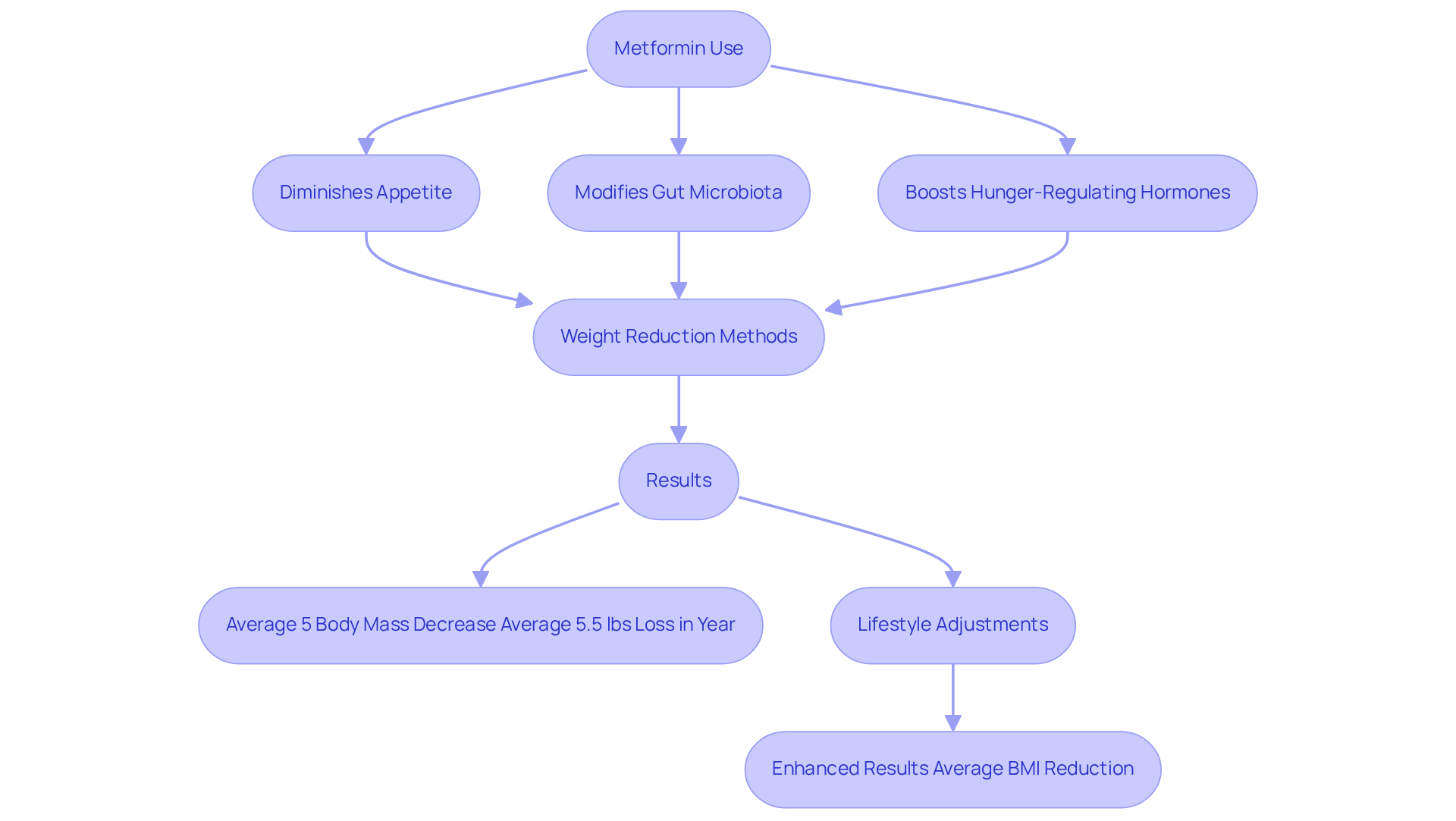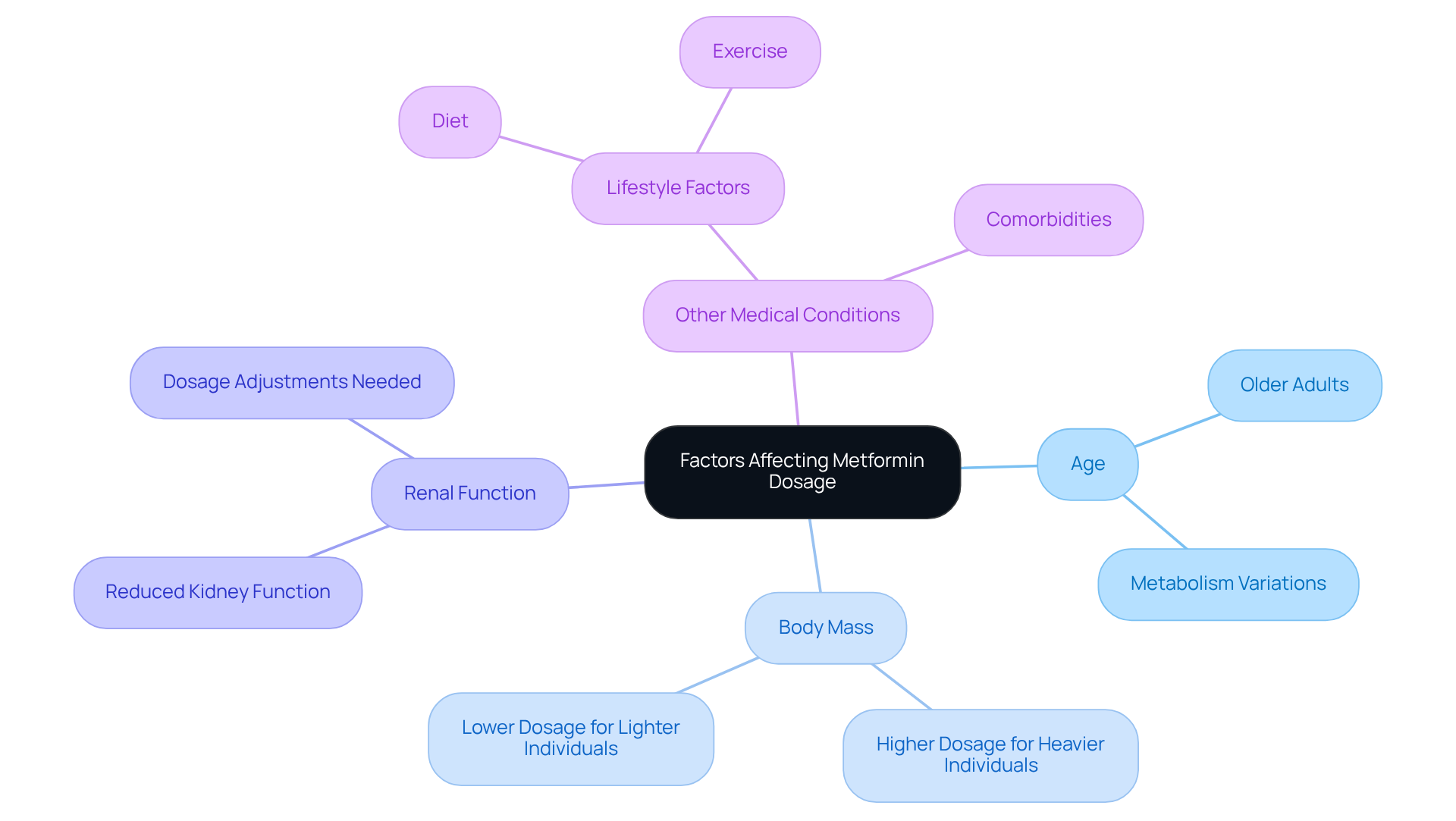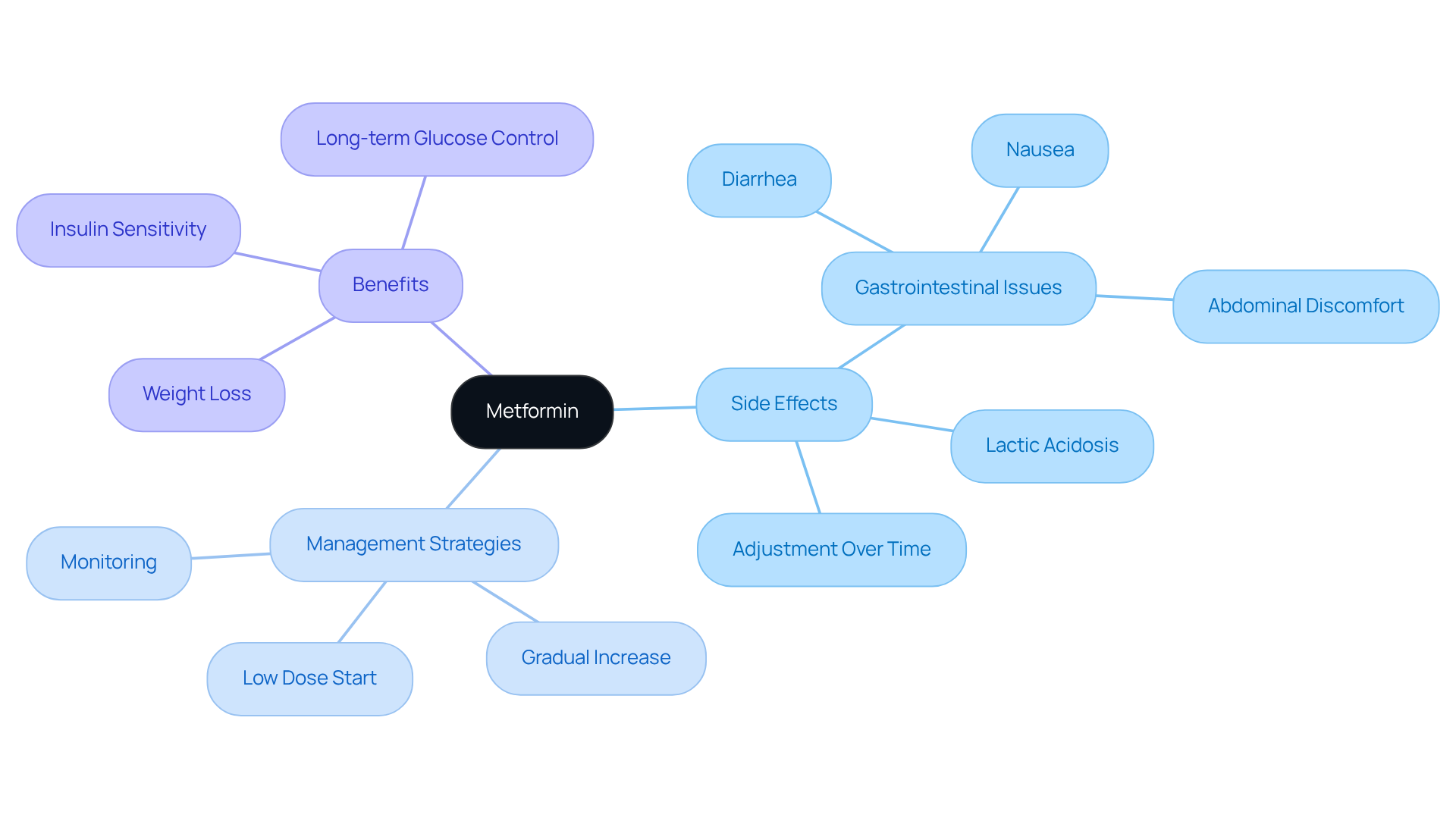Overview
This article aims to support you in understanding the right dosage of Metformin for effective weight loss, focusing on its important role in managing body composition and enhancing insulin sensitivity.
- Starting doses usually begin at 500 mg, with adjustments tailored to your individual tolerance and health factors.
- Research has shown that users often experience significant average weight reductions, especially when Metformin is combined with positive lifestyle changes.
Are you feeling overwhelmed by your weight loss journey? You’re not alone. Many individuals share similar experiences, and we’re here to help you navigate this path with compassion and understanding.
By recognizing the importance of Metformin in your weight loss efforts, you can take meaningful steps towards achieving your goals. Remember, together we can make this journey a successful one.
Introduction
Navigating the complexities of weight management can often feel like wandering through a labyrinth, particularly when considering medications like metformin. This widely prescribed drug, primarily recognized for its effectiveness in managing type 2 diabetes, has recently emerged as a potential ally in the pursuit of weight loss.
As you explore this topic, you will discover how the right dosage of metformin can not only assist in shedding pounds but also promote overall health through personalized treatment plans tailored to your needs.
However, with these benefits come important questions about safety, side effects, and the intricacies of dosage adjustments.
How can you ensure that you are using metformin effectively and safely on your weight loss journey? Together, we can navigate these challenges and find the best path forward for you.
Define Metformin: Purpose and Uses in Weight Management
This oral medication is primarily prescribed for managing type 2 diabetes, enhancing insulin sensitivity and reducing hepatic glucose production. Recently, it has gained attention for its off-label use in managing body composition, especially when combined with the dosage of metformin for weight loss and personalized health solutions like Compounded Tirzepatide offered by Minimal. This medication, specifically the dosage of metformin for weight loss, supports weight reduction through several effective methods: it helps diminish appetite, modifies gut microbiota, and boosts the release of hormones that regulate hunger.
Have you ever felt overwhelmed by your weight loss journey? Research indicates that approximately one-third of individuals taking the dosage of metformin for weight loss for a year experience at least a 5% decrease in body mass, with an average reduction of about 5.5 pounds in the initial year. This makes it a favored option among healthcare providers for patients dealing with obesity, particularly those facing insulin resistance or prediabetes, due to the effective dosage of metformin for weight loss. For instance, participants in a clinical trial saw an average reduction of 2.6 kg after 18 months of treatment with the medication.
Moreover, combining the dosage of metformin for weight loss with lifestyle adjustments—like a balanced diet and regular exercise—can significantly enhance your results. Many have found that this approach leads to an average BMI reduction of one point within just six months. At Minimal, our comprehensive body reduction solutions, starting at $99.99/month, emphasize the importance of tracking your progress and collaborating with healthcare professionals to adjust dosages and ensure safety, especially for elderly individuals who may experience side effects more acutely. Remember, together, we can achieve your goals.
Determine Dosage: Recommended Levels for Weight Loss
Starting your journey towards reducing body mass can feel overwhelming, but it’s important to know that you’re not alone. The initial amount of medication often recommended is 500 mg, taken once a day with meals to help minimize any gastrointestinal discomfort. While this medication is primarily used to manage blood sugar levels in individuals with type 2 diabetes, it’s vital to understand that the dosage of metformin for weight loss is not FDA-approved. Many healthcare professionals may prescribe the dosage of metformin for weight loss off-label, believing it can help control insulin response and reduce cravings.
As you progress, your healthcare provider might gradually increase your dosage based on how well you tolerate it. Many patients find themselves reaching a maintenance level of 1500 to 2000 mg per day, typically divided into two or three doses. It’s common for some individuals to experience gastrointestinal discomfort, such as nausea or diarrhea, especially in the early weeks of treatment. Remember, it’s crucial to maintain open communication with your healthcare provider to determine the appropriate dosage of metformin for weight loss that aligns with your health needs and goals.
Monitoring your health indicators—like blood sugar levels and vitamin B12—alongside any side effects is essential for making necessary adjustments to your treatment plan. For instance, if you experience gastrointestinal discomfort or notice little change in your body mass, these signs might prompt a reassessment of your dosage. By fostering a transparent dialogue with your healthcare team, you can tailor the dosage of metformin for weight loss to enhance your results effectively. Together, we can navigate this journey and achieve your goals with the right support and guidance.
Explore Factors Affecting Dosage: Personalization and Health Considerations
Understanding the suitable dosage of metformin for weight loss can feel overwhelming, but it’s influenced by several key factors that are important to consider. Age, body mass, renal function, and other medical conditions all play a role. For instance, if you have reduced kidney function, smaller doses may be necessary to avoid negative reactions, as metformin is primarily eliminated through the kidneys. Age is another critical factor; older adults often metabolize medications differently, which means adjustments in dosage may be needed to ensure both safety and efficacy.
Body mass significantly impacts the dosage of metformin for weight loss and its effectiveness in managing body composition. Heavier individuals might need a higher dosage of metformin for weight loss to achieve the desired therapeutic outcome, while those with lower body weight may find that they require less. Additionally, lifestyle factors like diet and exercise can further affect the drug’s effectiveness, highlighting the importance of a tailored approach that meets your unique needs.
It is crucial to personalize your treatment plan, especially when considering the dosage of metformin for weight loss. It allows healthcare providers to determine the most effective and safe dosage for you based on your individual circumstances. Recent guidelines emphasize a shift towards personalized treatment plans for type 2 diabetes, aiming to prevent serious complications and improve overall health outcomes. This approach not only enhances the effectiveness of metformin but also aligns with broader efforts to address health inequities, ensuring that everyone receives the care they need. Together, we can navigate this journey towards better health.
Assess Side Effects and Safety: Managing Risks with Metformin
While Metformin is generally well-accepted, it’s important to recognize that it can lead to some adverse reactions, particularly gastrointestinal issues like diarrhea, nausea, and abdominal discomfort. Many individuals experience a reduction in these reactions over time as their bodies adjust to the medication. To help mitigate these risks, healthcare providers often recommend starting with a low dose and gradually increasing it. Have you discussed this approach with your healthcare team?
Additionally, it’s crucial for patients to be monitored for more severe but uncommon reactions, such as lactic acidosis, especially if they have a history of kidney problems. By understanding these risks, you can make informed decisions about your treatment and engage in proactive management strategies. Remember, you’re not alone in this journey; we’re here for you.
Moreover, the dosage of metformin for weight loss provides significant benefits for managing body mass by enhancing insulin sensitivity, lowering blood sugar levels, and reducing the risk of heart disease and other complications related to diabetes. This dual effect not only supports weight loss but also improves long-term glucose control, highlighting the importance of the dosage of metformin for weight loss as a valuable option for those seeking to manage their diabetes effectively. Together, we can achieve your goals and work towards a healthier future.
Conclusion
Understanding the appropriate dosage of metformin for weight loss is essential for those seeking effective management of their body composition. This medication not only aids in enhancing insulin sensitivity but also plays a vital role in appetite regulation and overall metabolic health. By recognizing its off-label use for weight loss, individuals can navigate their weight management journey with informed guidance from healthcare professionals.
Starting with a low dose is crucial to mitigate potential side effects, and gradually increasing it based on personal tolerance and health indicators can make a significant difference. Have you considered how factors such as age, renal function, and body mass play a role in determining the optimal dosage for you? These elements are essential in tailoring a treatment plan that suits your unique needs. Furthermore, combining metformin with lifestyle changes like diet and exercise can significantly enhance your weight loss results.
Ultimately, your journey towards effective weight management with metformin underscores the importance of personalized treatment plans and open communication with healthcare providers. By understanding the medication’s benefits and potential risks, you can take proactive steps toward achieving your weight loss goals. Embracing this knowledge not only empowers you but also reinforces the notion that with the right support and tailored strategies, success in weight management is within reach. Remember, we’re here for you, and together, we can achieve your goals.
Frequently Asked Questions
What is Metformin and what is its primary purpose?
Metformin is an oral medication primarily prescribed for managing type 2 diabetes. It enhances insulin sensitivity and reduces hepatic glucose production.
How is Metformin used in weight management?
Metformin is gaining attention for its off-label use in managing body composition, particularly in weight loss. It helps diminish appetite, modifies gut microbiota, and boosts the release of hormones that regulate hunger.
What are the expected weight loss results when using Metformin?
Research indicates that about one-third of individuals taking Metformin for weight loss experience at least a 5% decrease in body mass within a year, with an average reduction of approximately 5.5 pounds.
Who benefits the most from Metformin for weight loss?
Metformin is favored among healthcare providers for patients dealing with obesity, particularly those facing insulin resistance or prediabetes.
What are the results from clinical trials regarding Metformin and weight loss?
Participants in a clinical trial saw an average reduction of 2.6 kg after 18 months of treatment with Metformin.
How can lifestyle changes affect weight loss with Metformin?
Combining Metformin with lifestyle adjustments, such as a balanced diet and regular exercise, can significantly enhance weight loss results, leading to an average BMI reduction of one point within six months.
What support does Minimal offer for weight management with Metformin?
Minimal offers comprehensive body reduction solutions starting at $99.99/month, emphasizing the importance of tracking progress and collaborating with healthcare professionals to adjust dosages and ensure safety.
Are there any considerations for elderly individuals using Metformin?
Yes, elderly individuals may experience side effects more acutely, so it’s important to monitor and adjust dosages under the guidance of healthcare professionals.





















